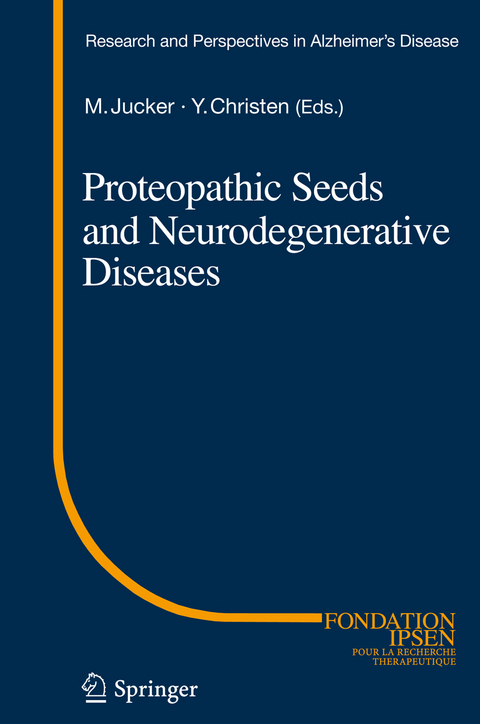
Proteopathic Seeds and Neurodegenerative Diseases
Springer Berlin (Verlag)
978-3-642-44696-2 (ISBN)
The misfolding and aggregation of specific proteins is an early and obligatory event in many of the age-related neurodegenerative diseases of humans. The initial cause of this pathogenic cascade and the means whereby disease spreads through the nervous system, remain uncertain. A recent surge of research, first instigated by pathologic similarities between prion disease and Alzheimer's disease, increasingly implicates the conversion of disease-specific proteins into an aggregate-prone b-sheet-rich state as the prime mover of the neurodegenerative process. This prion-like corruptive protein templating or seeding now characterizes such clinically and etiologically diverse neurological disorders as Alzheimer´s disease, Parkinson's disease, Huntington's disease, amyotrophic lateral sclerosis, and frontotemporal lobar degeneration. Understanding the misfolding, aggregation, trafficking and pathogenicity of the affected proteins could therefore reveal universal pathomechanistic principles for some of the most devastating and intractable human brain disorders. It is time to accept that the prion concept is no longer confined to prionoses but is a promising concept for the understanding and treatment of a remarkable variety of diseases that afflict primarily our aging society.
Preface.- Widening Spectrum of Prions Causing Neurodegenerative Diseases (Stanley B. Prusiner).- b-Amyloid Fibril Structures, In Vitro and In Vivo (Robert Tycko).- Structure-Activity Relationship of Amyloids (Jason Greenwald and Roland Riek).- Seeding and Cross-seeding in Amyloid Diseases (Per Westermark and Gunilla T. Westermark).- The Prion-like Aspect of Alzheimer Pathology (Sarah K. Fritschi, Bahareh Eftekharzadeh, Giusi Manfredi, Tsuyoshi Hamaguchi, Götz Heilbronner, Amudha Nagarathinam, Franziska Langer, Yvonne S. Eisele, Lary Walker, Mathias Jucker).- Amyloid-beta Transmissibility (Duran-Aniotz C, Morales R, Moreno-Gonzalez I, Soto C).- Prion-like Properties of Assembled Tau Protein (Florence Clavaguera, Markus Tolnay, and Michel Goedert).- Accumulating Evidence Suggests that Parkinson´s Disease is a Prion-like Disorder.- Nolwen L. Rey, Elodie Angot, Christopher Dunning, Jennifer A. Steiner, Patrik Brundin).- Propagation and Replication of Misfolded SOD1: Implications for Amyotrophic Lateral Sclerosis (Anne Bertolotti).- Development of Drugs that Target Proteopathic Seeds Will Require Measurement of Drug Mechanism in Human Brain (Peter T. Lansbury).- The Role of Functional Prions in the Persistence of Memory Storage (Eric R. Kandel, Irina Derkatch, Elias Pavlopoulos).- Subject Index.
"This is a current comprehensive text of the biochemical mechanisms of gene and protein expression encountered in Alzheimer's, Parkinson's, ALS, MS, prion disorders, and other degenerative diseases. ... Neurologists, neurophysiologists, biochemists, graduate students, postdocs, and anyone in drug development will find it very useful in their work." (Joseph J. Grenier, Amazon.com, January, 2016)
| Erscheint lt. Verlag | 8.2.2015 |
|---|---|
| Reihe/Serie | Research and Perspectives in Alzheimer's Disease |
| Zusatzinfo | XII, 156 p. |
| Verlagsort | Berlin |
| Sprache | englisch |
| Maße | 155 x 235 mm |
| Gewicht | 266 g |
| Themenwelt | Medizin / Pharmazie ► Medizinische Fachgebiete ► Pharmakologie / Pharmakotherapie |
| Medizin / Pharmazie ► Studium | |
| Naturwissenschaften ► Biologie ► Humanbiologie | |
| Schlagworte | amyloidosis • Parkinson's Disease • Prions • synucleinopathies |
| ISBN-10 | 3-642-44696-5 / 3642446965 |
| ISBN-13 | 978-3-642-44696-2 / 9783642446962 |
| Zustand | Neuware |
| Informationen gemäß Produktsicherheitsverordnung (GPSR) | |
| Haben Sie eine Frage zum Produkt? |
aus dem Bereich


